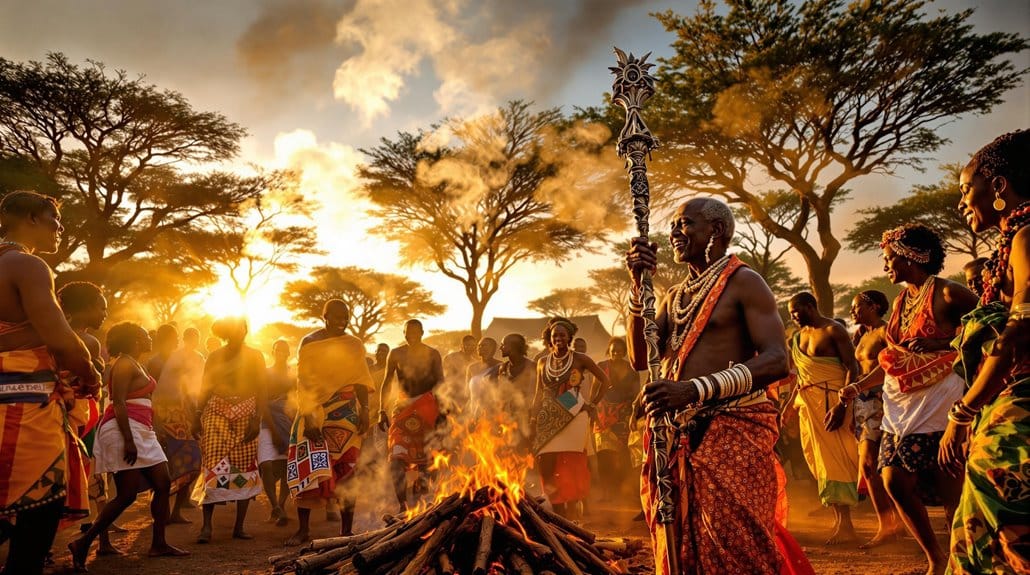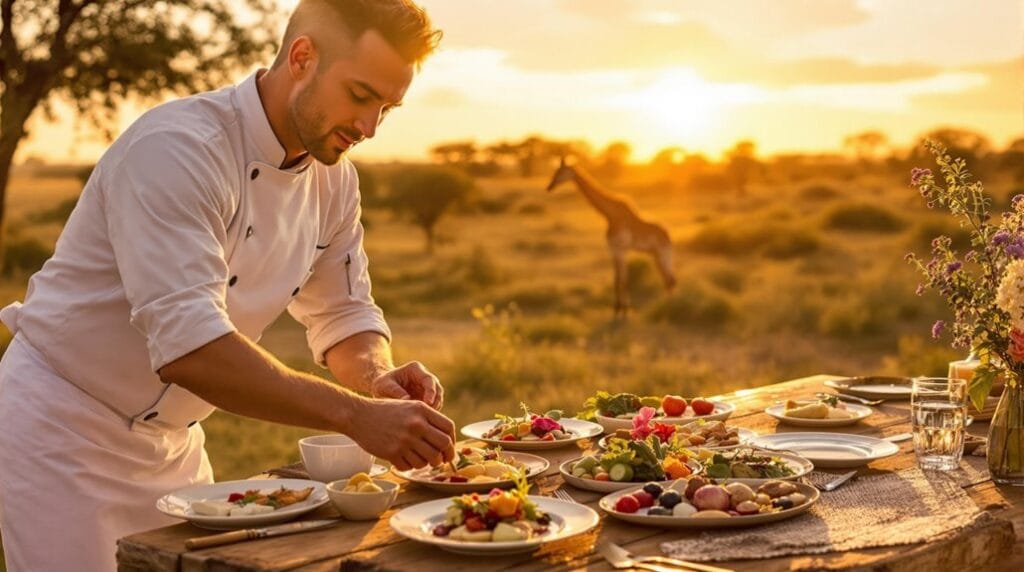You'll find that the best traditional spiritual practices in Africa foster community bonds and celebrate cultural heritage. Ancestral veneration keeps connections alive, while ritual sacrifices maintain balance with the spiritual dimension. Divination practices provide guidance, and healing traditions address the mind, body, and spirit seamlessly. Spirit possession ceremonies invite connection with ancestors, and community gatherings reinforce shared values. Beliefs in reincarnation nurture lineage ties, supported by Ubuntu philosophy promoting collective well-being. Sacred sites and pilgrimages deepen cultural identity. Each practice offers a unique lens into African spirituality, rich with meaning and tradition, inviting you to explore these profound connections further.
Key Takeaways
- Ancestral veneration rituals, such as pouring libations and sharing food, strengthen community ties and honor deceased ancestors as guardians of well-being.
- Ritual sacrifices maintain spiritual balance, with specific customs governing the selection of animals or items, reinforcing the connection to ancestors.
- Traditional healing practices utilize herbal remedies and spiritual rituals, addressing mind, body, and spirit, with ancestral veneration central to healing processes.
- Divination practices, including casting lots and interpreting entrails, connect individuals with ancestors, providing guidance for personal and community decisions.
- Community gatherings and ceremonies embody the Ubuntu philosophy, promoting social responsibility, compassion, and collective well-being through shared rituals and cultural narratives.
Ancestral Veneration
Ancestral veneration stands as a cornerstone of many African traditional religions, weaving together threads of spirituality, community, and identity. When you engage in ancestral veneration, you recognize that your ancestors continue to influence your life, guiding you through spiritual connections that transcend time.
Rituals and offerings are essential in this practice, as they honor those who came before you. You might find yourself pouring libations, sharing food, or placing items at ancestral shrines to seek blessings and guidance.
This deep respect for ancestors fosters community cohesion, reminding everyone of shared values and moral order. When you neglect these rituals, it's believed you may invite misfortune or illness, as ancestors serve as guardians of your well-being.
In many traditions, ancestors hold a higher spiritual status, acting as mediators between you and the Supreme Being or deities.
Ritual Sacrifices
In many African cultures, ritual sacrifices play an essential role in maintaining the balance between the spiritual and natural worlds. These practices aren't just acts of devotion; they embody a deep understanding of the interconnectedness between you, your community, and the spiritual forces that govern life.
When you engage in ritual sacrifices, whether through offerings of animals, food, or other valuable items, you're honoring your ancestors and reinforcing their crucial role as mediators between the living and the divine.
The intent behind these sacrifices is profound. You're seeking blessings, protection, and community well-being, ensuring that the essential life forces flow freely between domains. Each culture has its unique customs surrounding these offerings, often dictating specific animals or items for particular rituals.
Blood sacrifices, seen as especially powerful, foster a reciprocal relationship between you and the divine, nourishing the spirits with the life force contained within.
Ultimately, participating in ritual sacrifices enriches your connection to your ancestors and the broader community, creating a harmonious bond that sustains both spiritual and earthly existence.
Divination Practices
When you explore divination practices in Africa, you'll find a rich tapestry of methods, from casting lots to interpreting animal entrails.
These practices aren't just rituals; they embody a deep cultural significance, connecting people with their ancestors and providing essential guidance for personal and communal decisions.
Diviners, often revered as intermediaries, play an important role in society, helping individuals navigate the complexities of life through spiritual insight.
Types of Divination Methods
Frequently, divination methods in Africa serve as vital conduits for understanding the spiritual world and steering through everyday life. The types of divination practiced vary markedly among different ethnic groups, creating a rich tapestry of cultural variations.
For instance, the Yoruba community uses Ifá divination, engaging with ancestral spirits through a divination tray and palm nuts. In contrast, the Zulu might rely on bone throwing to decipher the messages from the universe.
These spiritual specialists, or diviners, play a significant role in fostering social cohesion within their communities. They help resolve conflicts, offer guidance on health, relationships, and decision-making, ensuring harmony among individuals.
Traditional practices are deeply embedded in community rituals, reinforcing the bonds that hold societies together.
Moreover, syncretism is evident as many Christians and Muslims in Africa weave these traditional divination methods into their spiritual lives, showcasing an ongoing negotiation of beliefs.
Cultural Significance of Divination
Divination practices in traditional African cultures hold profound cultural significance, acting as crucial links between the physical and spiritual domains. Through various methods like casting lots or interpreting dreams, you engage with the spirit world, seeking guidance on health, relationships, and finances. These practices are not just personal; they reinforce community bonds.
| Element | Significance |
|---|---|
| Diviners | Spiritual specialists offering insight |
| Rituals | Strengthening ties with ancestral spirits |
| Community | Fostering social cohesion and identity |
You'll find that each culture has distinct techniques, like the Yoruba's Ifá divination or the Xhosa's bone-throwing practices. These methods are steeped in traditional beliefs and often involve rituals and offerings that maintain favorable relationships with ancestors. With over 30% of people regularly consulting diviners, the efficacy of divination highlights its deep-rooted importance in everyday life. It's more than a practice; it's a crucial thread in the fabric of your community, connecting you to your heritage and the wisdom of those who came before.
Role of Diviners in Society
Within the intricate web of traditional African societies, diviners emerge as essential figures, bridging the domains of the physical and the spiritual. As spiritual intermediaries, they interpret messages from the ancestors and offer guidance that influences both personal lives and communal dynamics. Their expertise is sought for a range of issues, underscoring their crucial role in maintaining social harmony.
Diviners utilize various divination tools to uncover hidden knowledge and foresee future events, including:
- Cowrie shells that reveal insights about relationships and decisions.
- Oracle bones that connect the living with the spirit world.
- Water as a medium for clarity and reflection on health and wellbeing.
Often, divination practices intertwine with healing and traditional medicine, as diviners are seen not just as spiritual guides but also as medical experts. They diagnose ailments and prescribe treatments, reinforcing their importance in community ceremonies and rituals.
The elevated status of diviners within these societies reflects a deep respect for their ability to communicate with ancestors and deities, making them indispensable to the fabric of traditional African life. Through their work, diviners foster a sense of belonging and continuity within the community.
Healing Traditions
When you explore the healing traditions in Africa, you'll find that traditional healers hold an essential role within their communities, offering a blend of herbal remedies and spiritual practices to address both physical and emotional ailments.
Their methods, often rooted in ancestral wisdom, reflect a holistic approach to health that intertwines the body, mind, and spirit.
Role of Traditional Healers
The role of traditional healers in Africa is essential to the health and well-being of many communities. These practitioners are often the first point of contact for over 30% of individuals in several countries, particularly where economic barriers limit access to conventional healthcare.
Traditional healers embody a holistic approach, intertwining spiritual guidance and ancestral connections with their practices, consequently fostering a sense of belonging within their communities.
Here are a few key aspects of their role:
- Cultural Relevance: Traditional healers are deeply rooted in local customs and beliefs, making them trusted figures in community health.
- Integrated Practices: Their methods aren't just health-related; they're woven into the fabric of daily life, influencing social and spiritual dimensions.
- Herbal Knowledge: With specialized knowledge of herbal medicine, they provide treatments that resonate with patients' cultural contexts.
Herbal Remedies and Treatments
Exploring the rich tapestry of herbal remedies in Africa reveals a profound connection between nature and culture, where healing practices are as diverse as the landscapes themselves.
You'll find that over 80% of the population in many African countries relies on these herbal treatments for their primary healthcare needs. Traditional healers, custodians of this knowledge, utilize roots, leaves, and bark, ensuring that the wisdom of medicinal properties is passed down through generations.
In African cultures, herbal remedies are often intertwined with spiritual beliefs, creating a holistic approach to health. Traditional healers don't just address physical ailments; they also incorporate rituals and spiritual guidance to foster healing of the spirit.
In places like Senegal, where more than 50% of the population consults these healers, it's clear that trust in herbal medicine remains strong.
Research indicates that around 30% of people in 14 out of 19 surveyed African countries view traditional healing, including herbal treatments, as effective.
This highlights the crucial role these practices play in meeting community healthcare needs, emphasizing a shared understanding of wellness deeply rooted in cultural identity.
Spiritual Healing Practices
Herbal remedies often serve as a gateway to understanding the broader landscape of spiritual healing practices in Africa. These traditional healing practices aren't just about curing physical ailments; they embrace a holistic approach that addresses the mind, body, and spirit.
Traditional healers, often revered in their communities, combine their extensive knowledge of local flora with rituals rooted in culture and spirituality.
Some key aspects of spiritual healing practices include:
- Ancestor veneration: Honoring ancestors is central to many healing rituals, creating a connection that fosters community harmony.
- Rituals and ceremonies: These practices help restore balance, addressing spiritual disturbances and ensuring the well-being of individuals.
- Medicinal properties of plants: Healers utilize plants and animal parts, believed to possess specific healing qualities, to treat various conditions.
In this context, spiritual healing becomes a communal experience, reinforcing cultural ties and promoting collective well-being.
When you embrace these traditions, you're not only seeking personal healing but also nurturing connections that have stood the test of time, fostering a sense of belonging within your community.
Spirit Possession Ceremonies
Spirit possession ceremonies play an essential role in many African traditional religions, allowing individuals to connect with ancestral spirits or deities for guidance and healing. In these vibrant rituals, participants often enter trance states through music, dance, and rhythmic drumming, transforming into vessels for the spirits. This process, particularly in Yoruba culture, is seen as sacred, where orisha (deities) temporarily inhabit practitioners, deepening community ties and reinforcing cultural identity.
Each region has its unique practices; for instance, in the Zulu tradition, offerings and sacrifices are made to appease the spirits before possession can safely occur. These ceremonies serve not only as individual experiences but also as a means to restore communal balance. When someone becomes possessed, they may relay important messages from the spirit domain, addressing community conflicts or personal grievances.
The power of spirit possession lies in its ability to create a shared experience that fosters belonging and unity among participants. Through these rituals, you're not just witnessing a profound connection to the spiritual sphere; you're also partaking in a dynamic tradition that honors the interconnectedness of life, community, and ancestral wisdom.
Totemism and Symbolism
Totemism embodies a profound connection between communities and their natural environments, serving as a cornerstone of identity within many African traditional religions. In these cultures, totems are more than symbols; they represent clans and families, fostering a deep sense of belonging. Each totem carries specific characteristics that members are expected to embody, encouraging respect and protection for their symbolic animal or plant.
The role of symbolism in rituals and ceremonies is significant, as totems often act as intermediaries, connecting the physical domains with the spiritual world. This interconnectedness is reflected in the community's mythology, which frequently recounts creation stories linking clans to their totems and emphasizing their ties to the natural world.
Key aspects of totemism include:
- Veneration of specific animals or plants: These totems embody clan identity and values.
- Respect and protection: Members are bound to honor and safeguard their totemic symbols, often prohibiting harm.
- Facilitating communication: Totems serve as conduits for connecting with ancestors and deities during rituals.
Through totemism, communities nurture a worldview rooted in harmony and reverence for all living beings, enriching their spiritual practices and cultural identity.
Community Gatherings
When you witness a community gathering in traditional African culture, you can feel the power of collective rituals that bring people together.
These events not only celebrate life's milestones but also strengthen the social bonds that define the community. Engaging in these shared experiences reinforces the values and beliefs that unite everyone, highlighting the spirit of Ubuntu.
Importance of Collective Rituals
- Offerings and sacrifices to ancestors or deities, invoking blessings for the community.
- Active involvement in rituals that strengthen the transmission of oral traditions and cultural knowledge across generations.
- Shared experiences that create a collective memory, reinforcing the ties that bind you to your heritage.
Strengthening Social Bonds
Community gatherings serve as vibrant occasions where individuals come together, both in spirit and practice, to reinforce social bonds that are crucial to traditional African cultures. During these events, communal feasts and celebrations invite families and clans to share not just food but also experiences, fostering a deep sense of belonging and shared identity.
Rites of passage, harvest festivals, and other significant gatherings create essential opportunities for connection, helping you feel woven into the fabric of your community.
Storytelling and oral traditions play a central role, transmitting cultural values and ancestral wisdom across generations. By participating in collective rituals, such as ancestor veneration ceremonies, you strengthen your kinship ties and embrace communal responsibilities, deepening your connection to your heritage.
These gatherings are especially poignant during life's milestones—births, marriages, and funerals—where each member's contributions enhance mutual support and solidarity.
As you engage in these enriching practices, you not only celebrate your culture but also reinforce the very bonds that make your community resilient. In this way, community gatherings become a powerful reflection of the importance of togetherness in traditional African life.
Reincarnation Beliefs
Reincarnation beliefs form an essential thread in the fabric of traditional African spirituality, intertwining with the reverence for ancestors and the ongoing connection between the living and the dead. These beliefs resonate deeply within various communities, where many see reincarnation as a continuation of existence rather than a finality.
You might find that:
- Spirits of the deceased are thought to return, influencing the lives of their descendants.
- Ancestral duties are viewed as crucial, encouraging individuals to maintain ties across generations.
- Cultural narratives around heritage emphasize the importance of lineage, shaping how reincarnation is understood.
In many traditional African religions, around 30% of people embrace the idea of rebirth. Interestingly enough, there's a noticeable trend where a higher percentage of Christians believe in reincarnation compared to Muslims, reflecting different interpretations of ancestral spirituality.
This interconnectedness between life and death fosters a sense of belonging and duty, linking you to a past that's ever-present. As you explore these beliefs, you'll see how they nurture community ties and affirm the significance of ancestry in shaping identities within the rich tapestry of African culture.
Ubuntu Philosophy
Ubuntu philosophy embodies a profound understanding of humanity, captured in the saying "I am because we are." This concept emphasizes the deep interconnectedness among individuals within African societies, where the well-being of one is intricately linked to the well-being of all. In embracing Ubuntu, you recognize that your identity and existence are rooted in the community around you.
This philosophy promotes values like compassion and respect, fostering a sense of belonging and shared purpose. It encourages you to prioritize collective well-being and social responsibilities in your daily life, reinforcing the understanding that your actions impact those around you.
Traditional rituals often reflect these principles, strengthening social cohesion and establishing a moral order that binds community members together.
Ubuntu's relevance extends beyond African cultures; it has gained international recognition as a guiding principle for conflict resolution and reconciliation, particularly in post-apartheid South Africa. By embodying the essence of Ubuntu, you contribute to a world where compassion reigns, and every individual thrives through the support of the community.
This interconnectedness nurtures not just personal growth, but a collective journey towards harmony and understanding.
Sacred Sites and Pilgrimages
Nestled within the diverse landscapes of Africa, sacred sites hold deep spiritual significance for many communities, serving as crucial connections to their ancestral heritage.
These locations, often marked by natural landmarks like mountains, rivers, and ancient trees, are believed to be inhabited by ancestral spirits. When you commence on a pilgrimage to these sites, you're not just seeking blessings; you're participating in a rich tapestry of rituals that reinforce social cohesion and cultural identity.
Consider these notable aspects of sacred sites and pilgrimages:
- Spiritual Significance: Each site embodies unique cultural beliefs, often linked to local deities or ancestral spirits.
- Cultural Heritage: Festivals like the Osun-Osogbo Festival draw thousands, celebrating the river goddess Osun and fostering community connections.
- Preservation Efforts: Protecting these sacred spaces is crucial for maintaining traditions in the face of urbanization and environmental challenges.
Frequently Asked Questions
What Is the Traditional Spirituality of Africa?
Traditional spirituality in Africa invites you to explore a rich tapestry of beliefs.
You'll find African cosmology emphasizes the interconnectedness of life, where ancestral worship plays a crucial role in honoring those who came before you.
Sacred rituals and healing traditions create a sense of community, while nature reverence reminds you of the spirit in all things.
Divination practices and spirit possession reveal deeper insights, fostering communal beliefs that bind you to your heritage.
What Is One Common Element of Most African Spiritual Traditions?
One common element in most African spiritual traditions is ancestor veneration.
You'll find that communities engage in communal rituals that honor their ancestors, blending oral traditions with cultural symbolism. These practices reflect cosmological beliefs, emphasizing nature reverence and the interconnectedness of life.
Spiritual healing often arises from divination practices, fostering a sense of belonging and shared identity. By participating in these rituals, you connect with your lineage and the spirit world, enriching your community's spirit.
What Are the Pagan Traditions in Africa?
In the rich tapestry of African pagan traditions, you'll find deep connections to the past, where ancestral worship honors the spirits that guide you.
Ritual dances and community ceremonies bring everyone together, celebrating life's cycles.
Sacred herbs heal and protect, while totemic beliefs bond you with nature's essence.
Divination methods offer insights into the unseen, revealing paths to harmony and understanding.
Embracing these practices fosters belonging and strengthens your community's spirit.
What Are the Principles of African Spirituality?
African spirituality embraces principles like ancestors' veneration and sacred rituals, connecting you to your heritage and community.
You'll find that communal harmony is essential, emphasizing collective wellbeing.
Nature connection is integral, reminding you of your place within the cosmos.
Spirituality education is woven through daily life, while healing practices and divination methods offer guidance and support.
These cosmological beliefs foster a deep sense of belonging, creating a rich tapestry of interconnectedness in your life.
Conclusion
In exploring these traditional spiritual practices, you discover a vibrant tapestry of beliefs that bind communities and honor ancestors. Just as the Baobab tree stands tall, rooted in the earth while reaching for the heavens, these practices connect the past with the present, weaving together individual and communal identities. Embracing this rich cultural heritage allows you to appreciate the profound wisdom in Africa's spiritual traditions, reminding us that every ritual, every gathering, tells a story of resilience and unity.








